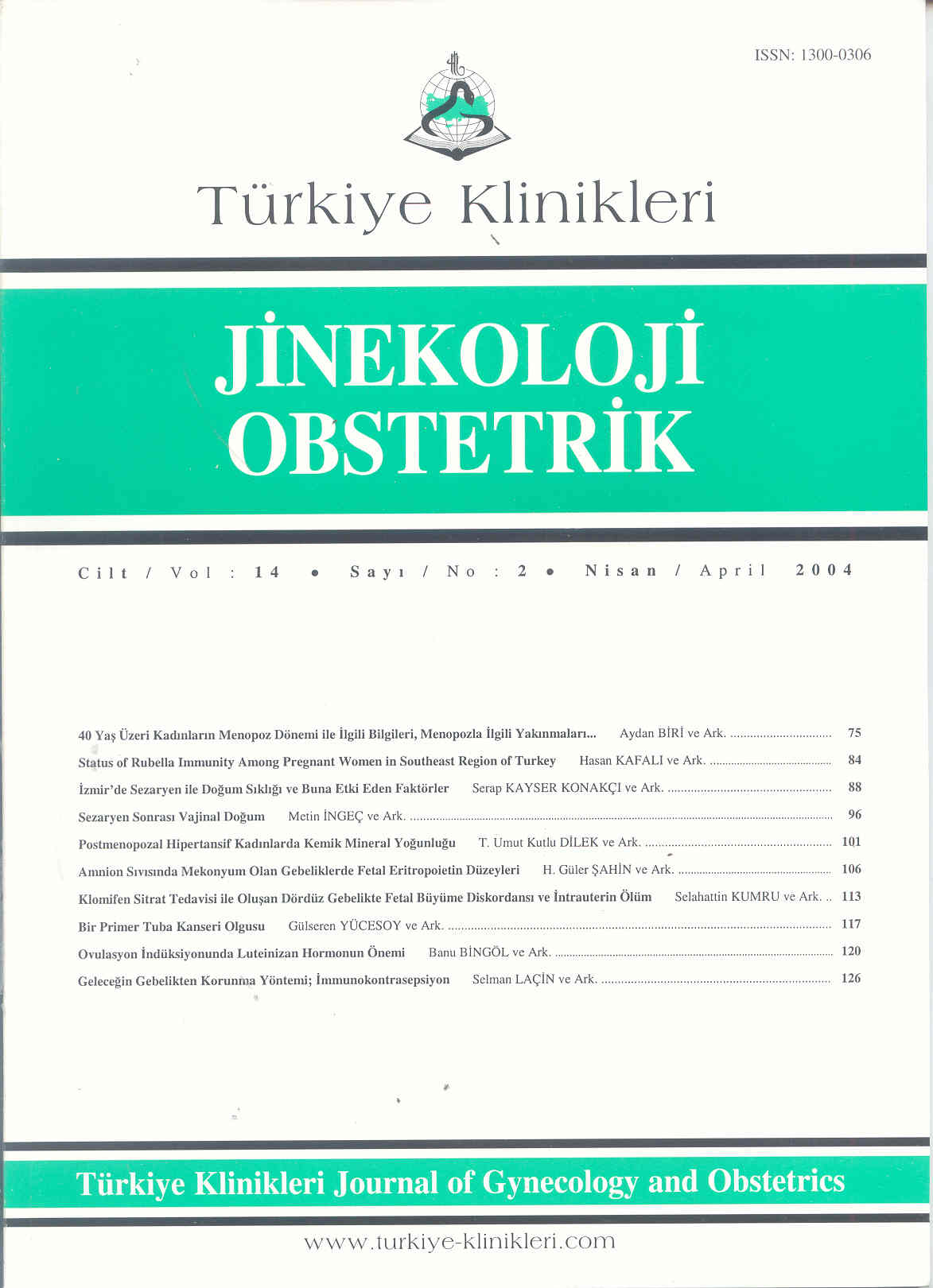Open Access
Peer Reviewed
ORIGINAL RESEARCH
3068 Viewed980 Downloaded
Status of Rubella Immunity Among Pregnant Women in Southeast Region of Turkey
Güneydoğu Anadolu Bölgesindeki Gebelerde Rubella İmmünitesinin Durumu
Turkiye Klinikleri J Gynecol Obst. 2004;14(2):84-7
Article Language: TR
Copyright Ⓒ 2025 by Türkiye Klinikleri. This is an open access article under the CC BY-NC-ND license (http://creativecommons.org/licenses/by-nc-nd/4.0/)
ÖZET
Amaç: Rutin antenatal gebelik takibine gelen kadınlarda Rubella enfeksiyonuna karşı bağışıklık durumunun belirlenmesi. Gereç ve Yöntemler: Güneydoğu Anadolu bölgesinde yaşayan gebe kadınlarda Rubella enfeksiyonuna karşı bağışıklık durumunun belirlenmesi amacıyla restrospektif olarak rutin antenatal gebelik takibi için gelen 1239 kadın değerlendirildi. Rubella IgG serum seviyesi ELISA (Axsym®, Abbott, Turkey) yöntemiyle belirlendi. Hastalar IgG seviyesine göre enfeksiyona karşı duyarlı, bağışık ve belirsiz olarak rapor edildi. Bulgular: Hastaların yaş ortalaması 29±5.6 (17-42 yaşlar arasında değişmekte)dır. 1239 gebe kadının; 1092 (%88.1)si bağışık, 132 (%10.6)sı duyarlı ve 15 (%1.2) i belirsiz olarak rapor edildi. Enfeksiyona karşı duyarlı ve belirsiz olarak rapor edilen hastaların hastaneden çıkışlarını takiben aşılanmaları önerildi. Sonuç:Bu bilgiler ışığı altında, gebelerin postpartum dönemde aşılanmasının Konjenital Rubella Sendromu riskini azaltacağı kanısına varıldı.
Amaç: Rutin antenatal gebelik takibine gelen kadınlarda Rubella enfeksiyonuna karşı bağışıklık durumunun belirlenmesi. Gereç ve Yöntemler: Güneydoğu Anadolu bölgesinde yaşayan gebe kadınlarda Rubella enfeksiyonuna karşı bağışıklık durumunun belirlenmesi amacıyla restrospektif olarak rutin antenatal gebelik takibi için gelen 1239 kadın değerlendirildi. Rubella IgG serum seviyesi ELISA (Axsym®, Abbott, Turkey) yöntemiyle belirlendi. Hastalar IgG seviyesine göre enfeksiyona karşı duyarlı, bağışık ve belirsiz olarak rapor edildi. Bulgular: Hastaların yaş ortalaması 29±5.6 (17-42 yaşlar arasında değişmekte)dır. 1239 gebe kadının; 1092 (%88.1)si bağışık, 132 (%10.6)sı duyarlı ve 15 (%1.2) i belirsiz olarak rapor edildi. Enfeksiyona karşı duyarlı ve belirsiz olarak rapor edilen hastaların hastaneden çıkışlarını takiben aşılanmaları önerildi. Sonuç:Bu bilgiler ışığı altında, gebelerin postpartum dönemde aşılanmasının Konjenital Rubella Sendromu riskini azaltacağı kanısına varıldı.
ANAHTAR KELİMELER: Rubella, Seroprevalance, Pregnancy
ABSTRACT
Objective: To determine the status of Rubella immunity of pregnant women in the southeast region of Turkey Material and Methods: A retrospective prenatal record review of 1239 women attending antenatal clinic was done. Rubella IgG level was determined by an automated enzyme linked immunoassay [ELISA (Axsym®, Abbott, Turkey)] and reported as immune, nonimmune, or uncertain. Results: The mean age of patients was 29±5.6 (ranging from 17 to 42). Among the 1239 women included, 1092 (88.1%) were found immune, 132 (10.6%) were found nonimmune and 15 (1.2%) were found uncertain. Patients who were reported as non immune and uncertain were interpreted to be susceptible for infection and immunization after hospital discharge was recommended. Conclusion: Recommendation for postpartum Rubella vaccination of nonimmune women should be adhered to in order to decrease the risk of congenital Rubella syndrome.
Objective: To determine the status of Rubella immunity of pregnant women in the southeast region of Turkey Material and Methods: A retrospective prenatal record review of 1239 women attending antenatal clinic was done. Rubella IgG level was determined by an automated enzyme linked immunoassay [ELISA (Axsym®, Abbott, Turkey)] and reported as immune, nonimmune, or uncertain. Results: The mean age of patients was 29±5.6 (ranging from 17 to 42). Among the 1239 women included, 1092 (88.1%) were found immune, 132 (10.6%) were found nonimmune and 15 (1.2%) were found uncertain. Patients who were reported as non immune and uncertain were interpreted to be susceptible for infection and immunization after hospital discharge was recommended. Conclusion: Recommendation for postpartum Rubella vaccination of nonimmune women should be adhered to in order to decrease the risk of congenital Rubella syndrome.
MENU
POPULAR ARTICLES
MOST DOWNLOADED ARTICLES





This journal is licensed under a Creative Commons Attribution-NonCommercial-NoDerivatives 4.0 International License.










